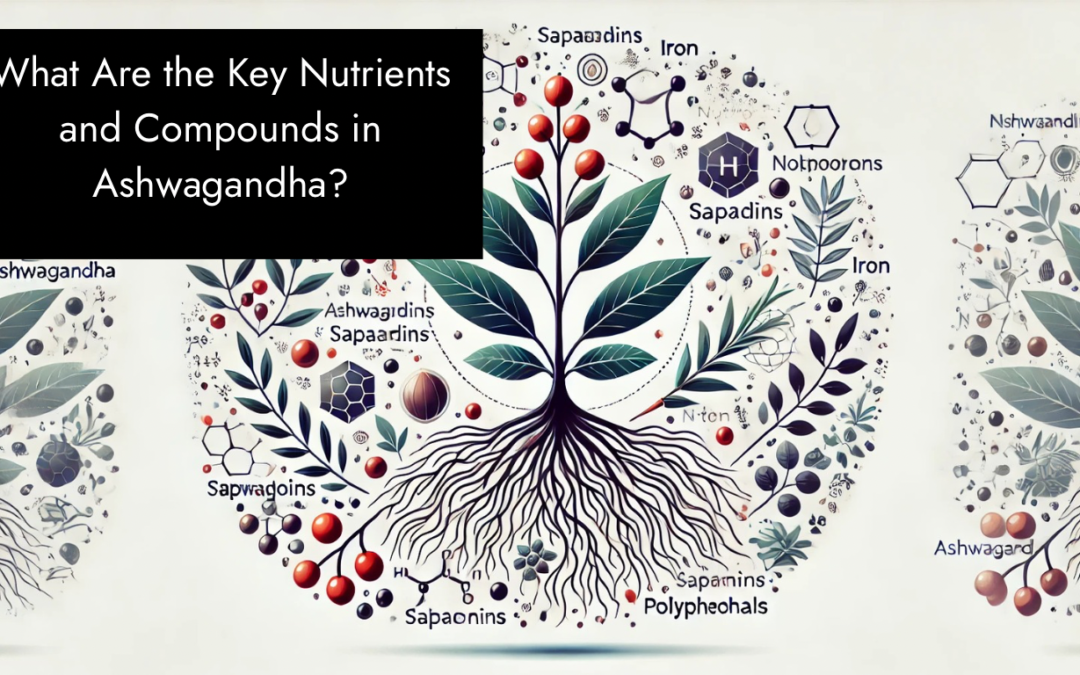Ashwagandha, also known as Withania somnifera, Indian ginseng, or winter cherry, is a renowned adaptogenic herb widely used in Ayurvedic medicine. This herb has been praised for its restorative properties and is used to combat stress, promote vitality, and boost overall health.
The active components of ashwagandha make it a powerful natural remedy, and its benefits are deeply rooted in its complex biochemical makeup. Let’s explore the key components of ashwagandha and their roles.
1. Withanolides
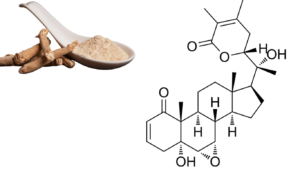
Withanolides are the primary bioactive compounds in ashwagandha, a class of steroidal lactones that contribute to the herb’s adaptogenic and therapeutic properties. These compounds have been studied for their anti-inflammatory, anti-tumor, and antioxidant effects. The main withanolides include withaferin A, withanolide D, and withanolide S.
- Withaferin A: Known for its anti-inflammatory and anticancer activities, withaferin A has shown promising results in inhibiting the growth of cancer cells in various studies. It also helps to manage inflammatory diseases by reducing oxidative stress in the body.
- Withanolide D: This compound has been researched for its potential in improving cognitive function and reducing neurodegenerative damage. It supports brain health and acts as a neuroprotective agent.
- Withanolide S: Another vital component that contributes to ashwagandha’s stress-reducing and adaptogenic properties.
Health Benefits of Withanolides
- Anti-Inflammatory Effects: Withanolides have been found to reduce inflammation by inhibiting the production of pro-inflammatory markers. This makes them helpful in managing conditions like arthritis, autoimmune disorders, and chronic pain.
- Antioxidant Properties: These compounds help fight oxidative stress by neutralizing harmful free radicals in the body. The antioxidant action of withanolides is beneficial in preventing cell damage and reducing the risk of chronic diseases such as cardiovascular disorders and neurodegenerative diseases.
- Anti-Cancer Potential: Withanolides, especially withaferin A, have shown promise in research studies for inhibiting cancer cell growth and inducing apoptosis (programmed cell death) in cancerous cells. While more clinical studies are needed, the preliminary results highlight ashwagandha’s potential in cancer prevention and treatment.
- Adaptogenic and Stress-Relieving Properties: Withanolides help the body adapt to physical and emotional stress by regulating cortisol levels. Lowering cortisol not only reduces stress but also helps protect the body from the negative effects of chronic stress, such as fatigue, weight gain, and immune dysfunction
2. Alkaloids
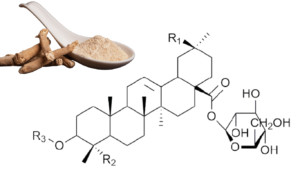
Ashwagandha contains a variety of alkaloids, such as somniferine, withanine, tropine, and cuscohygrine. These alkaloids contribute to the herb’s sedative, analgesic, and soothing properties.
- Withanine: This alkaloid has calming effects on the nervous system, aiding in stress and anxiety relief. It also supports the herb’s cognitive-boosting potential.
- Somniferine: Known for its sedative properties, somniferine helps improve sleep quality and manage insomnia, which is particularly beneficial for individuals experiencing stress-related sleep disorders.
Health Benefits of Alkaloids in Ashwagandha
- Anxiety and Stress Relief: Alkaloids like withanine and somniferine have a direct impact on the central nervous system, helping to reduce anxiety and promote relaxation. By calming the mind and soothing the nervous system, these alkaloids can lower stress levels and improve overall mental well-being.
- Improved Sleep Quality: The sedative effects of somniferine make ashwagandha an effective natural remedy for insomnia and other sleep disorders. By enhancing sleep quality, these alkaloids contribute to better rest and recovery.
- Cognitive Function and Focus: Withanine, in particular, is known for its nootropic (cognitive-enhancing) effects. It helps improve mental clarity, focus, and memory retention, which can be beneficial for individuals dealing with cognitive fatigue or brain fog.
- Muscle Relaxation: Tropine and cuscohygrine aid in relieving muscle tension and spasms. This makes ashwagandha a good option for those who experience physical stress or muscle discomfort, such as athletes or individuals with muscle-related ailments.
- Anti-Inflammatory Effects: Alkaloids like cuscohygrine contribute to the herb’s overall anti-inflammatory benefits. They help reduce inflammation in the body, which can alleviate symptoms of chronic inflammatory conditions.
3. Saponins
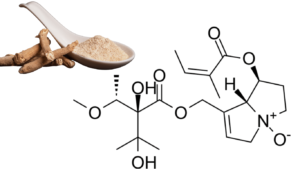
Ashwagandha also contains saponins, which have antioxidant and immunomodulatory properties. These compounds are essential for maintaining healthy immune function and protecting cells from oxidative damage.
- Sitoindosides VII and VIII: These saponins are known for their anti-stress and anti-inflammatory properties. They help the body adapt to stressors by regulating cortisol levels, which is crucial for preventing stress-related damage to the body’s tissues.
Health Benefits of Saponins in Ashwagandha
- Stress Reduction and Adaptogenic Properties: Saponins like sitoindosides support the body’s ability to adapt to stress by modulating the production of stress hormones, particularly cortisol. This adaptogenic action helps reduce the physiological impact of stress and supports a state of balance and well-being.
- Immune System Support: Saponins are known for their immunomodulatory effects. They enhance the body’s immune response by stimulating the production of white blood cells and promoting the activity of immune-boosting agents. This makes ashwagandha beneficial for overall immune health and resilience.
- Anti-Inflammatory Effects: Saponins contribute to reducing inflammation in the body by suppressing pro-inflammatory cytokines. This action is particularly valuable for managing chronic inflammatory conditions, such as arthritis, and promoting joint health.
- Antioxidant Protection: The antioxidant properties of saponins help combat oxidative stress by neutralizing free radicals. This protects cells from damage and reduces the risk of developing chronic diseases related to oxidative stress, such as cardiovascular disease and neurodegenerative disorders.
4. Amino Acids
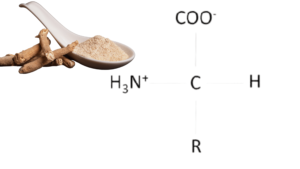
The presence of essential amino acids such as tryptophan in ashwagandha contributes to its overall health benefits, including improved mood and reduced anxiety. Tryptophan is a precursor to serotonin, a neurotransmitter that regulates mood, appetite, and sleep.
- Tryptophan: By aiding in serotonin production, tryptophan can help combat anxiety and depression. It plays a role in stabilizing mood and enhancing sleep quality.
Health Benefits of Amino Acids in Ashwagandha
- Mood Enhancement and Anxiety Reduction: Tryptophan and GABA-related activity in ashwagandha promote the regulation of neurotransmitters responsible for mood stabilization. These amino acids help combat anxiety, reduce symptoms of depression, and promote emotional well-being by supporting the brain’s neurochemical balance.
- Improved Sleep Quality: The calming effects of tryptophan contribute to better sleep by enhancing serotonin production, which, in turn, helps in the synthesis of melatonin, the sleep hormone. This makes ashwagandha effective for individuals dealing with insomnia or disrupted sleep patterns.
- Cognitive and Brain Function: Amino acids like glutamic acid support brain health and cognitive performance. By improving memory, focus, and learning abilities, these compounds are essential for maintaining optimal mental functioning.
- Muscle Recovery and Physical Performance: Proline and alanine aid in tissue repair and muscle recovery. They help reduce muscle fatigue and enhance endurance, making ashwagandha a popular choice for athletes and individuals looking to improve their physical performance. Proline, in particular, supports joint health and may reduce the risk of injuries.
- Energy and Metabolism: Alanine helps in glucose metabolism, ensuring a steady supply of energy to muscles during physical activity. This is particularly beneficial for individuals who engage in strenuous exercise or have physically demanding routines.
5. Fatty Acids
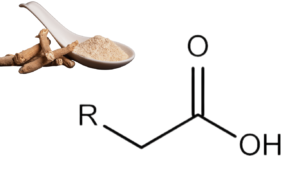
Ashwagandha contains small amounts of fatty acids that help improve nutrient absorption and contribute to the herb’s overall efficacy. These lipids are crucial for maintaining healthy cellular functions.
- Linoleic Acid: This essential fatty acid helps reduce inflammation and supports brain health.
Health Benefits of Fatty Acids in Ashwagandha
- Anti-Inflammatory Properties: Linoleic acid and oleic acid have anti-inflammatory effects that help reduce inflammation throughout the body. This can be particularly beneficial for individuals suffering from chronic inflammatory conditions like arthritis or autoimmune disorders. By reducing inflammation, these fatty acids also contribute to joint and muscle health.
- Cardiovascular Support: Oleic acid is known to promote heart health by helping to lower bad cholesterol (LDL) levels while increasing good cholesterol (HDL) levels. This action helps reduce the risk of cardiovascular diseases, such as hypertension and atherosclerosis. The presence of fatty acids in ashwagandha also supports healthy blood pressure regulation.
- Skin Health: Linoleic acid plays a critical role in maintaining healthy skin by strengthening the skin barrier and promoting moisture retention. It can help alleviate dry or inflamed skin conditions, making ashwagandha beneficial for skin health.
- Cell Membrane Integrity: The fatty acids in ashwagandha contribute to the structure and fluidity of cell membranes, ensuring that cells function properly and maintain their resilience to environmental stressors.
- Energy Production: Fatty acids, particularly palmitic acid, are used by the body as an energy source. They are metabolized to provide fuel for cellular activities, which can be important for maintaining overall vitality and stamina.
6. Polyphenols
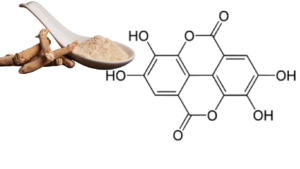
Polyphenols are plant-based compounds with antioxidant properties that protect against cellular damage. They help reduce the risk of chronic diseases and support overall well-being.
- Flavonoids: These are a group of polyphenols that enhance the herb’s antioxidant potential. They work to neutralize free radicals and lower the risk of chronic illnesses related to oxidative stress.
Health Benefits of Polyphenols in Ashwagandha
- Potent Antioxidant Effects: Polyphenols in ashwagandha help combat oxidative stress by neutralizing free radicals. This is crucial for protecting cells from damage, reducing the risk of chronic diseases like cancer, heart disease, and neurodegenerative disorders. The antioxidant effects also contribute to anti-aging benefits, improving skin health and vitality.
- Anti-Inflammatory Properties: The anti-inflammatory action of polyphenols helps reduce inflammation throughout the body. This makes ashwagandha useful for managing inflammatory conditions, such as arthritis or autoimmune disorders, and helps in relieving joint and muscle pain.
- Cardiovascular Health: Polyphenols support heart health by improving endothelial function (the health of the inner lining of blood vessels), reducing blood pressure, and preventing the oxidation of LDL cholesterol. These actions help maintain healthy blood vessels and reduce the risk of heart disease.
7. Iron
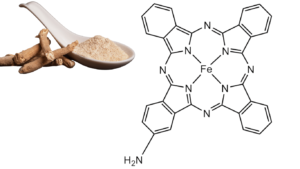
Ashwagandha is a rich source of iron, which plays a crucial role in maintaining healthy blood and supporting energy levels. Iron contributes to hemoglobin production, making ashwagandha particularly beneficial for individuals with anemia or those needing a natural energy boost.
Health Benefits of Iron in Ashwagandha
- Combatting Anemia: The iron content in ashwagandha can help prevent and treat iron-deficiency anemia, a condition characterized by fatigue, weakness, and pale skin. Ashwagandha may help improve hemoglobin levels and alleviate symptoms associated with low iron levels.
- Boosting Energy Levels: By supporting oxygen transport and energy production, the iron in ashwagandha can help reduce fatigue and increase stamina. This makes the herb especially valuable for individuals who feel chronically tired or those recovering from illness.
- Supporting Physical Strength and Endurance: Ashwagandha is popular among athletes and those looking to improve physical performance. The iron in ashwagandha supports muscle oxygenation, which is essential for strength and endurance during exercise.
- Enhancing Immune Health: Iron’s role in immune function means that consuming iron-rich foods like ashwagandha can help strengthen the body’s defenses. Ashwagandha’s adaptogenic properties, combined with its iron content, work to support overall immune resilience.
Conclusion
Ashwagandha’s diverse range of components, including withanolides, alkaloids, saponins, amino acids, fatty acids, polyphenols, and iron, makes it a powerful herbal remedy. Whether you’re looking to manage stress, boost cognitive function, or enhance your physical performance, the natural properties of ashwagandha can offer significant health benefits. However, as with any supplement, it’s important to consult with a healthcare professional before incorporating it into your wellness routine, especially if you have pre-existing conditions or are taking medication.
This ancient herb remains a staple in holistic medicine, offering a unique blend of bioactive compounds that continue to be explored for their vast potential in supporting human health.

